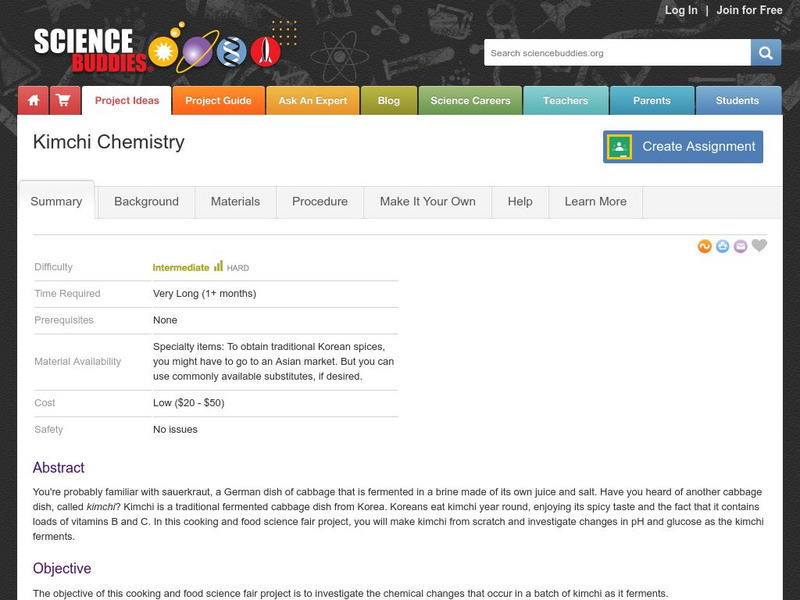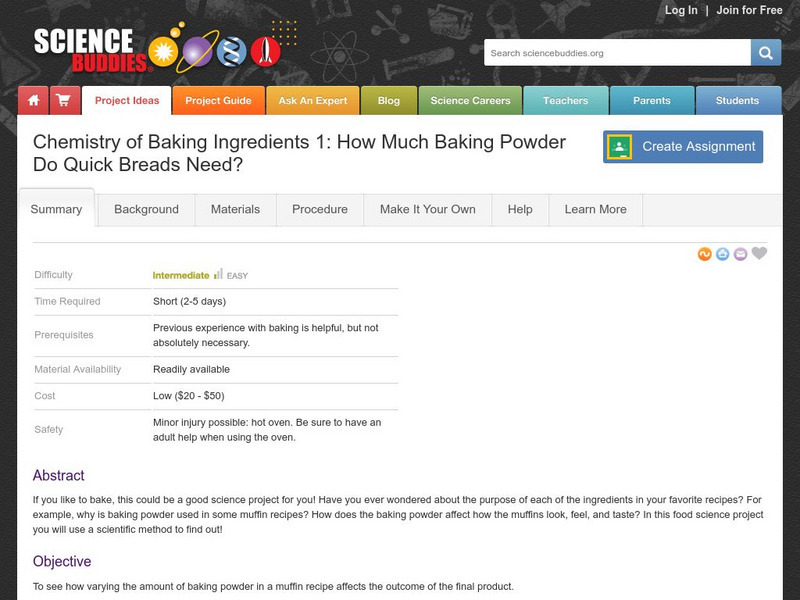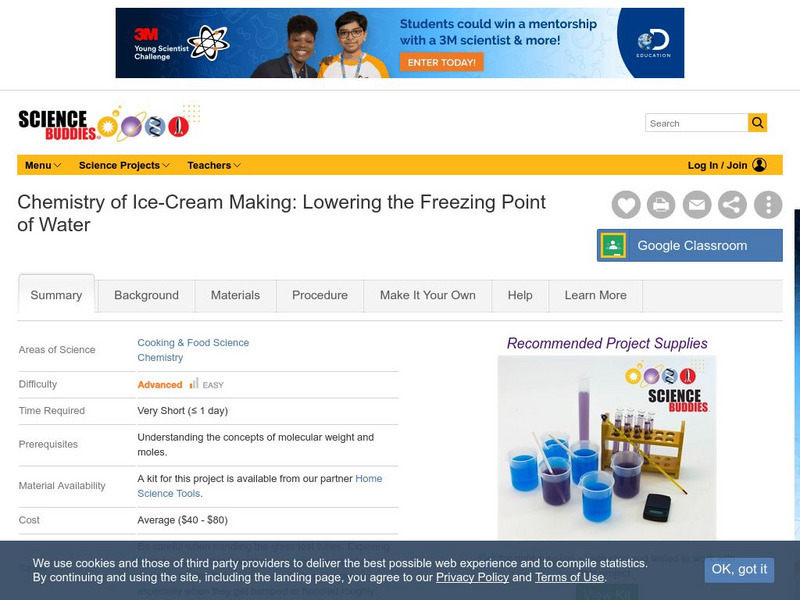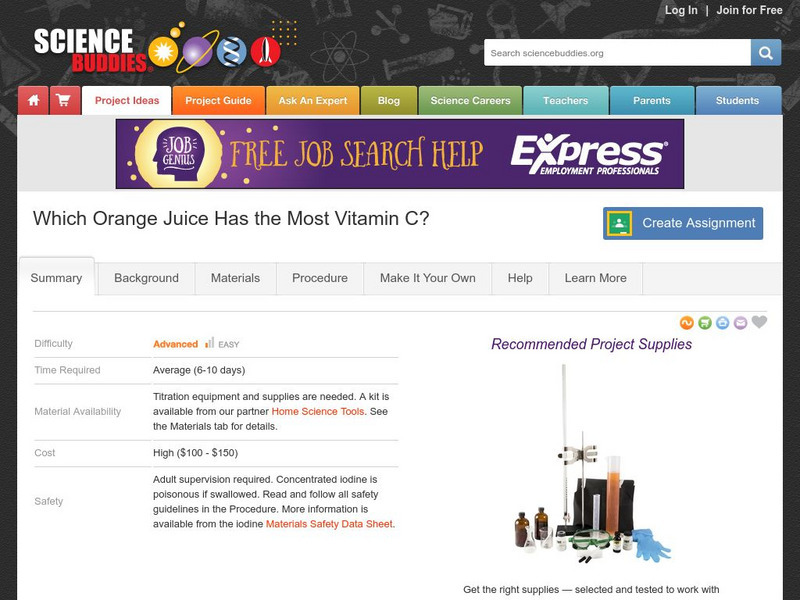Massachusetts Institute of Technology
Mit: Open Course Ware: Courses: Kitchen Chemistry
College-level online course focusing on kitchen chemistry. Course explores the application of chemistry in recipes and cooking. Course features include links to readings, lecture notes, and a wealth of related links.
Science Buddies
Science Buddies: Project Ideas: Kimchi Chemistry
In this cooking and food science fair project, the student will make a batch of kimchi, the national dish of Korea, and investigate the changes in pH and glucose concentration as it ferments. The Science Buddies project ideas are set up...
Royal Society of Chemistry
Royal Society of Chemistry: Kitchen Chemistry
A scientific approach to kitchen skills takes a look at the chemistry involved in preparing the food we eat.
Royal Society of Chemistry
Royal Society of Chemistry: Kitchen Chemistry: Video Clips
Sixteen program clips of various kitchen chemistry topics. See chefs at work carrying out edible chemistry experiments.
Science Buddies
Science Buddies: Can Baking Soda Substitute for Baking Powder in a Recipe?
There's nothing quite like the smell of fresh-baked muffins for breakfast on a Saturday morning. If you're into baking, you might want to try this insightful project that lets you witness the chemistry behind making muffins. You'll get...
Science Buddies
Science Buddies: Determining Iodide Content of Salt
In this week long "kitchen chemistry" project you will use chemicals from the supermarket to test for the presence of iodine and iodide in salt. These are common micronutrients added to some preparations of table salt. A materials list,...
Science Buddies
Science Buddies: The Science of Making Cheese!
Oooey gooey cheese - yum. Who doesn't like a slice of warm pizza straight from the oven? There's nothing quite like a slice of pizza and a glass of milk, so what makes pizza so great? The cheese. But did you know that making cheese is...
Royal Society of Chemistry
Royal Society of Chemistry: Kitchen Chemistry: Use of Salt in Cooking (1) [Pdf]
Instructions for experiments to see whether cooking green beans in salted water improves their taste, texture, or color.
Maryland Science Center
Maryland Science Center: Caramel Chemistry [Pdf]
This activity demonstrates the Maillard Reaction, which explains how browning and flavor develop when something is cooked.
Science Buddies
Science Buddies: How Much Baking Powder Do Quick Breads Need?
If you like to bake, this could be a good project for you. There is a purpose for each of the ingredients in your recipes, but not everyone is always aware of what that purpose may be. Though this lab takes multiple days, you will...
Science Buddies
Science Buddies: Lowering the Freezing Point of Water
When it comes to making ice cream, in order to make the mixture cold enough to freeze, you surround the container with ice and rock salt. This experiment helps you learn how the addition of salt (or other substances) affects the freezing...
Royal Society of Chemistry
Royal Soc. Of Chemistry: Kitchen Chemistry: Chemical Changes During Cooking [Pdf]
Article, with embedded questions, describes the chemical changes that take place when meat is cooked when sugar is heated, and when fruits brown.
Science Buddies
Science Buddies: Which Orange Juice Has the Most Vitamin C?
In this project you'll learn how to measure the amount of vitamin C in a solution using an iodine titration method. You will hypothesize which juice will contain the most vitamin C, and then compare the amount of vitamin C in three...
Exploratorium
Exploratorium: Bread Science
From Chinese baozi to Armenian lavash, bread comes in thousands of forms. Find out, on the most basic level, what chemistry ties them all together.
Science Buddies
Science Buddies: When Science Is Sweet: Growing Rock Candy Crystals
Though rock candy seems to be a simple enough treat, it is also pretty interesting to make. Crystallized sugar that can be grown from a sugar-water solution is just how rock candy is made. In this experiment, you will learn to make your...
Science Buddies
Science Buddies: Do Oranges Lose or Gain Vitamin C After Being Picked?
Are oranges highest in vitamin C when they are fresh from the tree (or, in a pinch, the grocery shelf)? In this project you'll learn how to measure the amount of vitamin C in a solution using an iodine titration method.











